- Home
- John Bellairs
The Vengeance of the Witch-Finder
The Vengeance of the Witch-Finder Read online
THE VENGEANCE OF THE WITCH-FINDER
The horrible laugh sounded again. It was deep, sinister, and angry. It bubbled in an awful way, as if it were coming from a huge, decaying chest. Something with claws closed on Lewis’s ankle, and he yanked his foot away. He heard a terrifying growl as he popped through the opening and into the maze. Then he began to run. His Sherlock Holmes hat nearly fell off. He clapped one hand on top of his head to hold it on, and with the other he tried to find the switch for the flashlight. He ran into a hedge, all prickly twigs and branches.
And it grabbed him.
“An excitingly chilling read. . . . Supplies a good ghostly dose of Gothic chills that tingle the imagination.”
—VOYA
“The atmosphere and supernatural effects are particularly eerie. . . . Satisfyingly hair-raising.”
—Kirkus Reviews
PUFFIN CHILLERS BY JOHN BELLAIRS
Lewis Barnavelt Books
The House with a Clock in Its Walls
The Figure in the Shadows
The Letter, the Witch, and the Ring
The Ghost in the Mirror
The Vengeance of the Witch-Finder
Johnny Dixon/Professor Childermass Books
The Secret of the Underground Room
Anthony Monday Books
The Mansion in the Mist
THE VENGEANCE
OF THE
WITCH-FINDER
JOHN BELLAIRS
Completed by Brad Strickland
Frontispiece
by Edward Gorey
PUFFIN BOOKS
PUFFIN BOOKS
Published by the Penguin Group
Penguin Group Young Readers
Penguin Group (USA) LLC
375 Hudson Street
New York, New York 10014
USA * Canada * UK * Ireland * Australia
New Zealand * India * South Africa * China
penguin.com
A Penguin Random House Company
First published in the United States of America by Dial Books for Young Readers, a member of Penguin Books USA Inc., 1993
Published in Puffin Books, 1995
Text copyright © 1993 by The Estate of John Bellairs
Frontispiece copyright © 1993 by Edward Gorey
Penguin supports copyright. Copyright fuels creativity, encourages diverse voices, promotes free speech, and creates a vibrant culture. Thank you for buying an authorized edition of this book and for complying with copyright laws by not reproducing, scanning, or distributing any part of it in any form without permission. You are supporting writers and allowing Penguin to continue to publish books for every reader.
The Library of Congress has catalogued the Dial edition as follows:
Bellairs, John
The vengeance of the witch-finder / John Bellairs; completed by Brad Strickland; frontispiece by Edward Gorey.—1st ed.
p. cm.
Summary: In 1951, while visiting a distant cousin in the English countryside, thirteen-year-old Lewis Barnavelt accidentally unleashes demonic forces and summons the ghost of an evil wizard bent on killing the Barnavelt family.
[1. Magic—Fiction. 2. Supernatural—Fiction. 3. England—Fiction.] I. Strickland, Brad. II. Gorey, Edward, ill. III. Title.
PZ7.B413Ve 1993 [Fic]—dc20 93-10081 CIP AC
Puffin Books ISBN: 0-14-037511-2
e-ISBN: 978-1-101-65977-9
To Richard Curtis,
advisor and friend
B.S.
Table of Contents
CHAPTER ONE
CHAPTER TWO
CHAPTER THREE
CHAPTER FOUR
CHAPTER FIVE
CHAPTER SIX
CHAPTER SEVEN
CHAPTER EIGHT
CHAPTER NINE
CHAPTER TEN
CHAPTER ELEVEN
CHAPTER TWELVE
CHAPTER THIRTEEN
CHAPTER FOURTEEN
CHAPTER FIFTEEN
CHAPTER ONE
The young, blue-eyed police officer blinked in surprise. Then he smiled and saluted, touching the narrow brim of his bobby’s helmet with respect. “Good morning, Mr. Holmes,” he said in a loud and cheerful voice. “It’s wonderful to see you back in London, sir, if you don’t mind my saying so.”
Lewis Barnavelt could feel himself blushing. A chubby, blond boy of about thirteen, Lewis stood with his uncle Jonathan on the sidewalk of a bustling London street. Lewis suddenly felt very silly in his blue windbreaker, brown corduroy pants, and checked deerstalker hat. “Uh,” he mumbled, “I’m not really Sherlock Holmes.” As soon as he had said it, he felt twice as foolish as before.
The bobby pretended astonishment. “No? Why, I apologize, then. You must forgive me, sir. I simply assumed that you were the great detective traveling incognito. You see, Mr. Holmes was a master of disguise.”
“I know,” said Lewis. “We’re looking for Baker Street, where he and Dr. Watson lived. This is my uncle, Jonathan Barnavelt, and I’m Lewis Barnavelt. We’re from America.”
“And I am Police Constable Henry Dwiggins. I am happy to meet you both. Good morning to you, sir,” said the bobby. He gave Uncle Jonathan an amiable nod.
Jonathan did not notice. He was trying heroically to refold a street map of the city. “Hello, yourself,” he said in a grumpy voice. Though no one could tell just by looking at him, Jonathan Barnavelt was a wizard. Not a wicked sorcerer, but a gentle, bearded, heavyset, easygoing magician who could conjure up wonderful three-dimensional illusions. Unfortunately, he could not conjure up the ability to read a map well—or to refold it neatly. “We’re lost,” he confessed to the young policeman. “And my sense of direction has deserted me. Could you please help us find Baker Street?”
The constable smiled. “Of course, sir. A good many Yanks come looking for Mr. Holmes’s flat, and I have pointed them in the right direction. I like Americans, have ever since I flew with them during the war. As it happens, I am off duty now. I’ll show you the way, if you wish.”
“Thank you very much.” Jonathan’s unsuccessful but athletic efforts to fold the map made his red hair and bushy red beard bristle. A light breeze caught the fluttering paper and flapped a corner of it into Jonathan’s mouth. “Ptui!” he spat. At last he gave up. He simply crushed the map into a more-or-less flat rectangle, which he thrust into the back pocket of his khaki wash pants. He wore brown walking shoes, a red vest over a blue open-collared shirt, and a rumpled gray-tweed jacket. “You are most kind,” Jonathan boomed, sounding much more friendly now that the map was out of the way. “Of course, Lewis and I know that Sherlock Holmes and Dr. Watson were just fictional characters, but we thought it would be fun to explore their neighborhood.”
The officer’s eyes twinkled. “Of course, sir. But come to that, fictional characters of that sort are a bit realer than you and me, if you take my meaning. I mean, look at me, now: In a hundred years, who’ll come looking for my house? Nobody. But you can be sure that people will still be searching for Mr. Holmes’s flat at 221B Baker Street. Now if that isn’t being real, I don’t know what is.”
“Could you please tell us where Sherlock Holmes, uh, might have lived?” asked Lewis. He normally was timid in the presence of strangers, but he sensed that the young policeman shared his enthusiasm for the Sherlock Holmes tales.
“Well, I have an idea or two.” Constable Dwiggins nodded twice. “If I’m right, he lived rather close by. Come along with me, and you may see what I mean. You have to understand, though, that these old streets have suffered through a lot of changes. Since the 1890’s they have been renumbered and bombed and built back up and renumbered again, so your guess may be quite as
good as mine.”
The three strolled along for a few blocks. It was a cloudy, cool morning in late June of 1951. This was the third day of a six-week European vacation that Lewis and his uncle were taking. Originally, they had planned for Uncle Jonathan’s neighbor and best friend, Mrs. Florence Zimmermann, to join them, together with Lewis’s friend Rose Rita Pottinger. Then Rose Rita had broken her ankle. She could not go on the trip because she would have to wear a cast for about six weeks. Mrs. Zimmermann had considerately decided to stay home in New Zebedee, Michigan, to keep Rose Rita company.
Though Lewis missed both Mrs. Zimmermann and Rose Rita, he had to admit that even without them, the trip had been—well, maybe the best word was exciting. Jonathan and Lewis had traveled by bus and train from New Zebedee to New York. From there they had flown in an airliner to London. Lewis had fretted the whole way. What if one of the airplane’s engines stopped working halfway across the Atlantic? What if fog covered the airport when they arrived, and the pilot crashed the plane into the ground? What if the crazy British traffic, which all moved on the wrong side of the street, got them into a dreadful automobile accident? Of course, none of these awful events had happened, but Lewis was a worrywart and could not help dreaming up possible disasters. At least he always got a pleasant feeling of relief when his worst fears failed to come true. On Monday Lewis and his uncle had arrived safe and sound at their London hotel. They had spent one day resting, and today they were out to see the sights.
“Now,” said Constable Dwiggins suddenly, as he came to a halt at a street corner. “Here we are on Baker Street. Look around, Lewis, and see what you can observe. I’ve no doubt you know Holmes’s methods.”
Lewis did as he suggested. On both sides of the street stood rows of three-story buildings, stone fronted and respectable. At first nothing appeared unusual about any of them. Then Lewis’s eyes narrowed. “It must be that one,” he said. He pointed to the second floor of an apartment building on his side of the street, nestled between the offices of a dairy and a driving school.
“Wonderful, Mr. Holmes!” the policeman said with a warm chuckle. “My thoughts exactly. You see the reason, of course.”
Lewis thought carefully. “I can see at least three different reasons,” he replied at last.
“Bravo.”
Uncle Jonathan laughed. “Well, I must be about as dense as Dr. Watson. I don’t see anything about this building that makes it any different from the others. If it isn’t too much trouble, would you please tell me what I am missing?”
With a broad smile, Constable Dwiggins nodded to Lewis and asked, “Would you care to enlighten the gentleman, Mr. Holmes?”
Lewis put his hands behind his back, the way Sherlock Holmes often did in the stories when he began to explain his deductions. “First,” he said, “that apartment house faces east. In ‘The Adventure of the Dancing Men’ Holmes held a paper up so the sunlight fell upon it, and that was in the morning. That means the windows of Holmes’s flat had to look out to the east.”
“First-rate,” said Dwiggins. “Go on.”
A small but noisy truck rumbled by, giving Lewis a chance to think about his next point. When the clamor died down, Lewis said, “You will notice the front door of this building has a semicircular fanlight over it. So did the door of 221B. Watson mentions that detail in ‘The Adventure of the Blue Carbuncle.’”
Jonathan shook his head, making his beard waggle. “How on earth do you remember all that?” he asked. “I’ve read all of Conan Doyle’s stories myself, but—oh, well. What is the third reason, my dear fellow?”
Lewis turned and pointed across the street. “In ‘The Adventure of the Empty House’ Watson says an empty building was directly across Baker Street from 221B. This is the only house that has another one directly opposite it. The others are sort of off center.”
“Right you are!” said Dwiggins. “Good work, Mr. Holmes.”
“Have I missed anything?” asked Lewis, unable to keep from grinning broadly.
Constable Dwiggins returned his grin. “Oh, one or two minor items, but I can’t fault you for them. For instance, I have learned that this is the only house in this part of Baker Street that has a backyard where the famous plane tree could grow. And I happen to know that the stairway has exactly seventeen steps leading up to the first floor. Sorry, you Yanks call that the second floor, I believe. Now, it’s true that the flat does not sport a bow window. However, Colonel Moran must have smashed the original window when he fired his airgun through it—either that, or the German bombs shattered it during the war. Either way, the present owners must have replaced the broken bow window with a regular window—”
Jonathan raised his hands in surrender. “I give up!” he said. “Take me away. Plane trees and bow windows and seventeen steps mean less than nothing to me, but then I’m as thick as a London fog and as blind as an American bat.”
Both Constable Dwiggins and Lewis laughed. “Not at all, sir,” said Dwiggins. “And I apologize if you feel left out by all this. It takes a real Sherlock Holmes fanatic to understand the excitement of tracking down the exact location of 221B Baker Street.”
Constable Dwiggins had to go then, but before he left, he gave Lewis and Jonathan several helpful hints about what to see in London. Then he and Lewis exchanged addresses, so they could write to each other about Sherlock Holmes. Lewis felt a little sad after the young police officer had gone. It was fine to pretend to be as dashing and as brilliant as Sherlock Holmes. Unfortunately, when he stopped pretending, Lewis had to admit that he was not like him at all. His friends at school often made fun of him because he was fat and something of a bookworm. In fact, Lewis thought, he resembled the “middle-sized, strongly-built” Dr. Watson more than he did the tall, athletic Sherlock Holmes. Still, it was fun to assume the role of Holmes, as he had just done. At such times even one or two gloomy thoughts could not completely ruin his good mood.
Lewis and Jonathan went on from Baker Street to visit the British Museum. After that they dropped into some strange little shops in narrow back streets, where Jonathan browsed among musty, cluttered shelves. He was searching for some mystical-looking talisman to give to Mrs. Zimmermann as a present. Years before, Mrs. Zimmermann had specialized in studying the magic of talismans at the University of Göttingen in Germany. She collected all sorts of mysterious knickknacks. Jonathan eventually found a small stone scarab that dated all the way back to ancient Egypt. It was an elaborate little carving, a realistic beetle with some flecks of blue and black enamel still showing on its wings and legs. After some dickering with the shop owner over the price, Jonathan bought it. Outside the shop, he held it up and said to Lewis, “According to the shopkeeper, this little doohickey is about three thousand years old. I think Mrs. Z. ought to like it, don’t you?”
“Sure,” said Lewis. “I bet she doesn’t have anything like that in her collection.”
“I know she hasn’t,” replied Jonathan. He put the scarab back into its little box. Then he sighed. “Of course, it isn’t what I would really like to give her.”
Lewis knew what his uncle meant. Mrs. Zimmermann had once been a much more powerful magician than Jonathan Barnavelt. Jonathan could only create illusions, but Mrs. Zimmermann could actually work magical transformations. At least, she could until she had lost her witchy powers in a fight with an evil spirit about a year and a half earlier. She had saved Lewis’s life in that battle, and she always said that she had no regrets. Still, both Jonathan and Lewis suspected that she missed her magic more than she admitted. If Jonathan had been able, he would have given Mrs. Zimmermann a very special present. He would return her lost magical talents to her. But he could not find a way to do that. Now both Jonathan and Lewis felt a little sad, so they went back to their hotel, planned the next day’s tour, and turned in early.
CHAPTER TWO
In all, Lewis and his uncle spent three exhausting but enjoyable days shopping and seeing the sights. They visited the Tower of London, that a
ncient brooding fortress on the River Thames where in the old days prisoners had lost their heads to the executioner’s axe. Lewis was interested to learn that when Henry VIII had had his wife Anne Boleyn beheaded, he had ordered something special: The headsman had used a fine French sword instead of an ordinary axe. Lewis wondered if that had made much difference to poor Anne, and Jonathan said it probably had not, but then it was the thought that counted. They saw Buckingham Palace, where the King of England lived, and they watched the ceremony of the Changing of the Guard. They explored the busy, bustling, and mysterious old city of London, finding something new at every street corner and down every narrow alley. Uncle Jonathan enjoyed himself as long as he could poke about in bookshops and curiosity shops, and soon his normal good humor returned.
Everything went very smoothly, and to his surprise Lewis found himself walking miles every day with enthusiasm. Usually he did not much care for exercise, because he thought of himself as clumsy and heavy, but now these long strolls just gave him more energy. He did occasionally complain about the English food, which he considered bland and odd tasting, but he kept so busy that he hardly thought about that except at mealtimes.
Finally, Lewis and Jonathan checked out of their Mayfair hotel and caught a train to the village of Dinsdale down in Sussex, the countryside well to the south and west of London. “Why are we going to Dinsdale?” Lewis asked his uncle for the tenth or twelfth time that day. Jonathan had been very secretive about this part of the trip, and had announced their destination only that morning.
“Well, I suppose it’s time to spring my surprise,” said Jonathan, leaning back in his seat. They had a first-class compartment all to themselves and sat facing each other. Jonathan put his thumbs into his vest pockets, as he often did while talking, and said, “I don’t know if your father ever mentioned it, Lewis, but our family has a long history. A good part of that history took place here in England.”

 The Curse of the Blue Figurine
The Curse of the Blue Figurine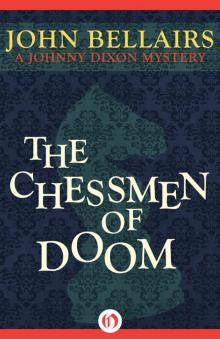 Chessmen of Doom
Chessmen of Doom Secret of the Underground Room
Secret of the Underground Room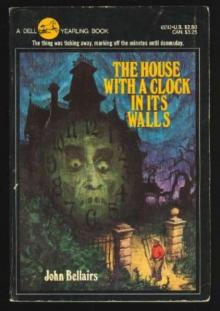 The House With a Clock in Its Walls
The House With a Clock in Its Walls The Vengeance of the Witch-Finder
The Vengeance of the Witch-Finder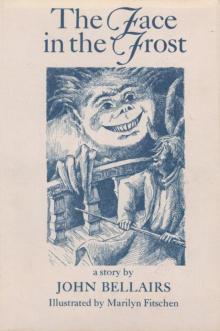 The Face in the Frost
The Face in the Frost Revenge of the Wizard's Ghost
Revenge of the Wizard's Ghost Spell of the Sorcerer's Skull
Spell of the Sorcerer's Skull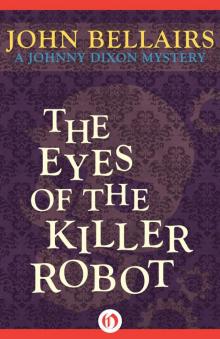 Eyes of the Killer Robot
Eyes of the Killer Robot Mummy, the Will, and the Crypt
Mummy, the Will, and the Crypt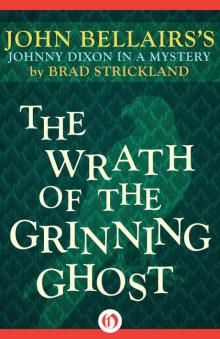 Wrath of the Grinning Ghost
Wrath of the Grinning Ghost The Mansion in the Mist
The Mansion in the Mist The Doom of the Haunted Opera
The Doom of the Haunted Opera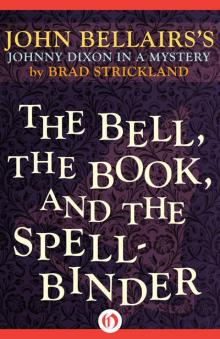 The Bell, the Book, and the Spellbinder
The Bell, the Book, and the Spellbinder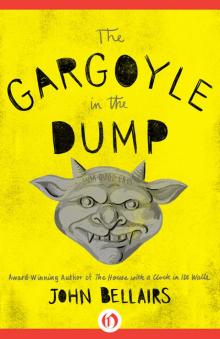 The Gargoyle in the Dump
The Gargoyle in the Dump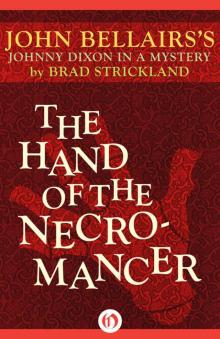 The Hand of the Necromancer
The Hand of the Necromancer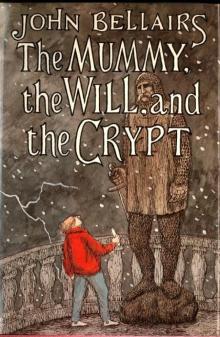 The Mummy, the Will, and the Crypt
The Mummy, the Will, and the Crypt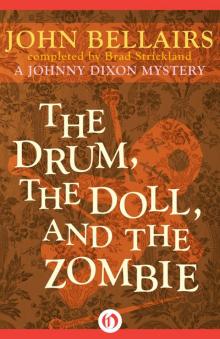 Drum, the Doll, and the Zombie
Drum, the Doll, and the Zombie The Specter from the Magician's Museum
The Specter from the Magician's Museum The Letter, the Witch, and the Ring
The Letter, the Witch, and the Ring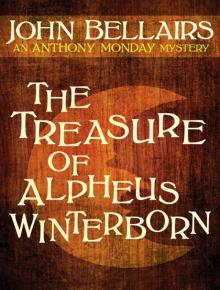 The Treasure of Alpheus Winterborn
The Treasure of Alpheus Winterborn The Dark Secret of Weatherend
The Dark Secret of Weatherend The Figure in the Shadows
The Figure in the Shadows